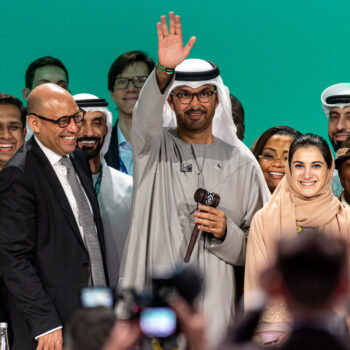After meeting for the G7 Hiroshima Summit yesterday, G7 leaders have today released their communique. Please find below some initial reactions from our experts.
Alden Meyer, E3G Senior Associate, said:
“G7 leaders acknowledge we are facing a climate crisis and call on other countries to do more to fight it, but they weaken this message by not walking the talk at home. In particular, Japan’s resistance to phasing out coal power generation and Germany’s insistence on more public investment in gas undercut the G7’s leadership at a time when it is desperately needed.”
It is welcome that G7 leaders support international trade reforms and scaled-up public and private sector investment to help developing countries build resilient and sustainable clean energy supply chains, but they need to provide more specifics about how they intend to live into these objectives or risk seeing this initiative dismissed as nice-sounding rhetoric without sufficient substance to back it up.”
On finance:
Sonia Dunlop, Program Leader, Public Banks, said:
“The G7 Leaders are right to call on the multilateral development banks to co-ordinate and act as a single system, they have a crucial role to play in transforming the global economy to meet the climate challenge. G7 support of recent progress on capital adequacy reforms and the World Bank Evolution Roadmap is welcome but much more is still needed including injections of substantial new capital into the MDBs.”
Sima Kammourieh, Senior Policy Advisor, International Sustainable Finance, said:
“It is good to see G7 Leaders supporting the work of the International Sustainability Standards Board (ISSB), as the final publication of standards for general reporting on sustainability, and on climate-related disclosures, nears. But we need more at this stage. We now need to see G7 countries committing to working closely with the ISSB, and with each other, to achieve the global interoperability of standards they speak of. It is first and foremost up to them to drive this forward, and to lead by example. We have no time to lose in building these critical new global norms.”
Kate Levick, Associate Director, Sustainable Finance, said:
“Transition finance will be key to the changes we need in this decisive decade. Leaders have confirmed the need for corporates to have credible 1.5-aligned corporate climate transition plans. The ball is now in the court of financial regulators to begin setting these requirements by the end of this year.”
On fossil fuel phase-out:
Camilla Fenning, Programme Leader, Fossil Fuel Transitions, said:
“The G7 Leaders, for the first time, highlight the urgency of ending the construction of new unabated coal plants. It is significant progress that the G7 recognise not only their own responsibilities on no new coal, but the need to encourage and work with other countries to stop new construction as well. We hope to see this ambition increase momentum for further no new coal commitments at the G20, UN Ambition Summit and COP28.
The PGII and JETPs, endorsed by leaders, will be important mechanisms to achieve the scale-up of clean energy infrastructure and investment required to move swiftly away from coal.”
Yoko Mulholland, Senior Associate, Fossil Fuel Transitions, said:
“It is positive to see the G7 affirm that any use of hydrogen and ammonia must be prioritised for hard-to-abate sectors and be in clear alignment with climate goals and the goal to decarbonise the power sector by 2035.
However, the lack of a clear phase-out date for unabated coal is further proof of Japan falling behind its peers, as all other G6 countries are taking concrete steps to becoming coal free. In addition, the G7’s inability to dial up its commitment from a ‘predominantly’ to a ‘fully’ fossil free power system by 2035’ underlines Japan’s isolation among its peers, a direct result of a failure to adopt more ambitious domestic power sector decarbonisation plans.”
Maria Pastukhova, Senior Policy Advisor, energy, said:
“Though recognising the need to phase-out unabated fossil fuels by mid-century and accelerate the ramp-up of renewables while reducing gas demand, the leaders of the G7 still seem to be out of touch with the market and economic reality when it comes to gas investments.
Renewed endorsement for public finance in the gas sector shows that the Leaders, particularly Germany and Japan, are stuck in last year’s panic mode – a poor signal to their countries’ populations who continue to bear the high cost of gas dependency, and to international partners.”
Louise Burrows, Energy Finance Lead at E3G, said:
“Last year, Germany led G7 discussions that secured a ground-breaking commitment to end international public finance for fossil fuels by the end of 2022. However, the G7’s continued approval for public investment in the gas sector, led by Germany and Japan, is in direct breach of that commitment and severely undermines progress made on this agenda.”
The immediate energy crisis has passed and G7 leaders have failed to act in accordance with clear market signals and climate science that new investments in fossil fuels are no longer needed. What is needed is a prioritisation of public investment in clean energy, that will help prevent fiscal instability and reduce stranded asset risks, especially as global gas demand will continue to drop. This is critical not only to meet climate targets but also to bring down energy costs and managing energy security.”
Available for comment
E3G experts are available for reaction, background and comment. Please reach out to them directly:
Alden Meyer, Senior Associate (multilateral climate and clean energy diplomacy, mitigation ambition, US policy & politics)
m: +1-202-378-8619, alden.meyer@e3g.org
Camilla Fenning, Programme Lead (fossil fuel transition, coal phase-out, Southeast Asia and India)
m: +44 (0) 7961 047835, Camilla.fenning@e3g.org
Maria Pastukhova, Senior Policy Advisor (energy)
m: +49 (0) 157 779 195 58, maria.pastukhova@e3g.org
Louise Burrows, Senior Policy Advisor (fossil fuel finance)
m: +44 (0) 786 480 2177, louise.burrows@e3g.org
Sima Kammourieh, Senior Policy Advisor (G7/G20 finance ministers)
m: +49 (0) 160 9596 4443, sima.kammourieh@e3g.org
Jonny Peters, Senior Policy Advisor (trade, CBAM, G7 Clean Energy Economy Action Plan)
m: +44 (0) 7954 201 039, jonny.peters@e3g.org
Notes to editors
1. E3G is an independent climate change think tank with a global outlook. We work on the frontier of the climate landscape, tackling the barriers and advancing the solutions to a safe climate. Our goal is to translate climate politics, economics and policies into action. About – E3G
2. For further enquiries email press@e3g.org or phone +44 (0)7783 787 863
4. Receive occasional news and updates on geopolitical events via our WhatsApp briefing service E3G WhatsApp registration for journalists – E3G


